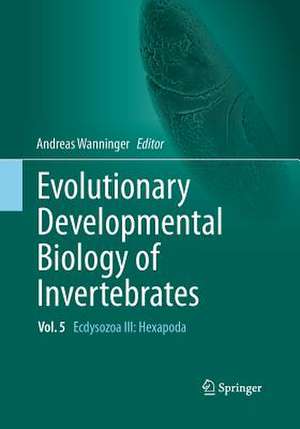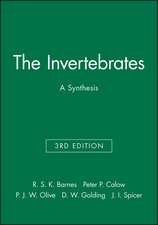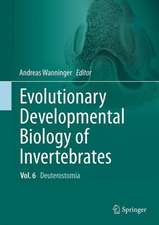Evolutionary Developmental Biology of Invertebrates 5: Ecdysozoa III: Hexapoda
Editat de Andreas Wanningeren Limba Engleză Paperback – 23 aug 2016
This third volume on ecdysozoans is dedicated to the Hexapoda. Despite being the most species-rich animal clade by far, comparatively little developmental data is available for the majority of hexapods, in stark contrast to one of the best-investigated species on Earth, the fruit fly Drosophila melanogaster. Accordingly, an entire chapter is dedicated to this well-known and important model species, while the two remaining chapters summarize our current knowledge on early and late development in other hexapods.
| Toate formatele și edițiile | Preț | Express |
|---|---|---|
| Paperback (1) | 387.58 lei 6-8 săpt. | |
| SPRINGER VIENNA – 23 aug 2016 | 387.58 lei 6-8 săpt. | |
| Hardback (1) | 401.61 lei 3-5 săpt. | |
| SPRINGER VIENNA – 5 oct 2015 | 401.61 lei 3-5 săpt. |
Preț: 387.58 lei
Nou
Puncte Express: 581
Preț estimativ în valută:
74.16€ • 77.43$ • 61.38£
74.16€ • 77.43$ • 61.38£
Carte tipărită la comandă
Livrare economică 04-18 aprilie
Preluare comenzi: 021 569.72.76
Specificații
ISBN-13: 9783709119969
ISBN-10: 3709119960
Pagini: 219
Ilustrații: VII, 219 p.
Dimensiuni: 178 x 254 mm
Greutate: 0.4 kg
Ediția:Softcover reprint of the original 1st ed. 2015
Editura: SPRINGER VIENNA
Colecția Springer
Locul publicării:Vienna, Austria
ISBN-10: 3709119960
Pagini: 219
Ilustrații: VII, 219 p.
Dimensiuni: 178 x 254 mm
Greutate: 0.4 kg
Ediția:Softcover reprint of the original 1st ed. 2015
Editura: SPRINGER VIENNA
Colecția Springer
Locul publicării:Vienna, Austria
Cuprins
Hexapoda: A Drosophila’s view of development.- Hexapoda: Comparative aspects of early development.- Hexapoda: Comparative aspects of later embryogenesis and metamorphosis.
Textul de pe ultima copertă
This multi-author, six-volume work summarizes our current knowledge on the developmental biology of all major invertebrate animal phyla. The main aspects of cleavage, embryogenesis, organogenesis and gene expression are discussed in an evolutionary framework. Each chapter presents an in-depth yet concise overview of both classical and recent literature, supplemented by numerous color illustrations and micrographs of a given animal group. The largely taxon-based chapters are supplemented by essays on topical aspects relevant to modern-day EvoDevo research such as regeneration, embryos in the fossil record, homology in the age of genomics and the role of EvoDevo in the context of reconstructing evolutionary and phylogenetic scenarios. A list of open questions at the end of each chapter may serve as a source of inspiration for the next generation of EvoDevo scientists. Evolutionary Developmental Biology of Invertebrates is a must-have for any scientist, teacher or student interested in developmental and evolutionary biology as well as in general invertebrate zoology.
This third volume on ecdysozoans is dedicated to the Hexapoda. Despite being the most species-rich animal clade by far, comparatively little developmental data is available for the majority of hexapods, in stark contrast to one of the best-investigated species on Earth, the fruit fly Drosophila melanogaster. Accordingly, an entire chapter is dedicated to this well-known and important model species, while the two remaining chapters summarize our current knowledge on early and late development in other hexapods.
This third volume on ecdysozoans is dedicated to the Hexapoda. Despite being the most species-rich animal clade by far, comparatively little developmental data is available for the majority of hexapods, in stark contrast to one of the best-investigated species on Earth, the fruit fly Drosophila melanogaster. Accordingly, an entire chapter is dedicated to this well-known and important model species, while the two remaining chapters summarize our current knowledge on early and late development in other hexapods.
Caracteristici
First book specifically describing invertebrate non-model organisms Written by designated experts in the respective areas Richly illustrated and easy-to-understand








